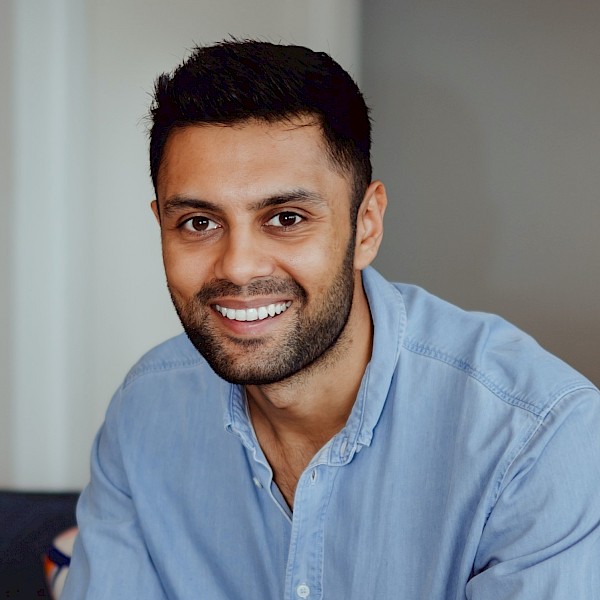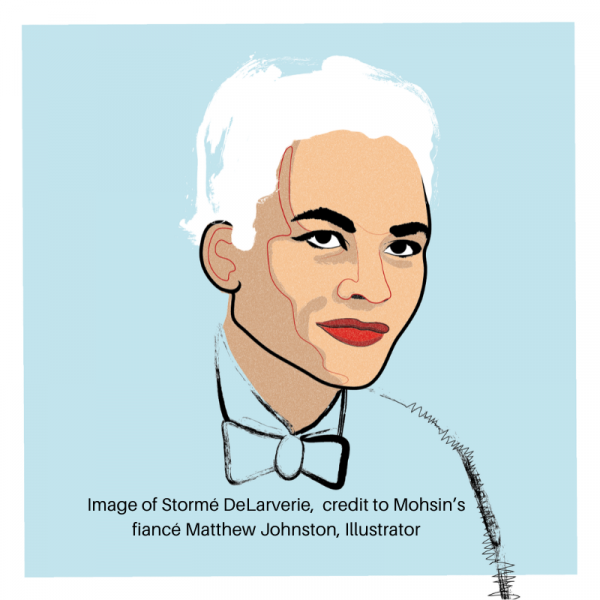A compassionate boy



At the start of Pride Week in London, Mohsin Zaidi, the Oxford educated criminal barrister talks about his upcoming book, ‘A Dutiful Boy’, and the intersectionality of his life that is gay, brown and Muslim.


Keen to stress that the point of his book is not to show how awful people are, Mohsin takes the reader on a journey through his own story, exploring how hard things can be and how human beings have to work through them together.
“If there's one thing I'd say the writing experience really brought me,” he says, “was the means to examine my own experience but through other people's eyes, more carefully because I was really trying to be respectful of their experience.”
‘A Dutiful Boy’ is the moving memoir of a young gay man growing up in East London’s deeply religious Shia Muslim community where the word ‘queer’ had no place in its culture.
More considerate and protective of the feelings of others than ‘dutiful’, Mohsin shows that if ever there was a message for the start of London Pride Week, it is that compassion for others should be a core theme in tolerance and acceptance of those who differ from ourselves.
“The advantage of taking time to think, reflect and write a few years later, is that when you're writing a memoir that's kind of steeped in family, you can think about it not just from your own perspective,” says Mohsin. “And as long as you love each other, you can try. Nobody's a villain here, right? We were all victims of a stigma that needs to be erased.”
The first student from his school to go to Oxford University, Mohsin did not allow stigma to dictate his path. He went on to accept a job at prestigious law firm, Linklaters and is now a criminal barrister working on cases of white collar crime. Also, on the board of Stonewall, the LGBTQ+ UK charity, he has appeared in the Financial Times OUTstanding list of Future Leaders and is a Governor at his old school.
Writing his book some 15 years after Oxford, he reflects on his experience there, the start of his reconciling with the gay man his upbringing had denied him. And it was post Oxford that he had to bring that reconciliation home. We would dread having any number of conversations with our parents, but the expectation to marry a Pakistani Shia Muslim woman when you are a gay man is not a subject the majority of us will have had to confront. And fewer still would have had the empathy towards our family that Mohsin exhibited.
“Well I think if I'm honest, sometimes I'd probably demonstrate more compassion for them than I did for myself, not necessarily in the book but definitely in real life, in terms of the experiences.”
He pauses. “You know, there were many times when a lot of my friends would say, ‘Where are you in all of this?’ And I look at that now and I think, if I had been advising me then, maybe I would have been more interventionist on behalf of that person who was more worried about their parents’ and brothers’ views than their own. But for me there was an innate incentive to get beyond the stigma of being who I was. They didn't have that same incentive. If I had found it hard to come out and accept my sexuality, then how could I expect them to just suddenly wake up and think ‘it's fine’?”
In ‘A Dutiful Boy’, Mohsin initially wrote that we are born broken. Fractured, vulnerable things whose life’s worth is to somehow build ourselves into whole beings. He realised as he wrote, that we are in fact all born whole and then quickly broken under the layers of history, oppression and societal expectations. The work of our lives is not to build ourselves into the perfect whole as expected of us, but to put those pieces back together again.
“There is a pressure within my community to not be too white”, quotes Mohsin from his book. “Then within the white community there's a pressure to not be too brown, and then within the gay community there's so much racism. So, I guess the single biggest struggle was being able to confidently be me, unapologetically, in a way that felt true and honest. And that is something that takes time”.
And so it is, in the last chapter of his book, that he likens the rebuilding and embracing of the self to the Japanese art of Kintsugi where broken pottery pieces are put back together with gold. By embracing the breaks and imperfections, an even stronger, more beautiful piece is formed, and what was once broken, once perceived to be ruined, is now beautiful again. Probably more so than it was in the beginning.
“That's one of those things isn’t it,” he muses. “Things happen really slowly and I guess through the process of writing the book, I’ve learned just how much we are all shaped by the things that happen to us. This story, my story, has really informed the person I am, the job I have, the things I care about and the things that I don't care about.”
As well as his legal day job and charity works, Mohsin has dipped his toes into the pool of politics. Supporting Sadiq Khan during his campaign to become Labour nominee for the London Mayoral elections of 2016, he became a member of the Labour party. Soon after the campaign was over and Khan was elected, Mohsin left Labour to join the Liberal Democrats who had announced themselves as the pro-EU party in the referendum on EU Membership.
“But I quickly realised that I don't have a political home”, he states conclusively. “I find the binary, two party system ridiculous. I think it's unfair. I think it really leads to disenfranchisement. I guess for me, writing the book is a political act, because as much as it is about sexuality and faith, it is also about class and about race and about the state of injustice in Britain today. So, although my kind of formal connection to any political party has stopped in some ways, I'd say the act of writing is a political thing.”
Binary, disenfranchisement, injustice… these are words that come up more than once during our conversation and are illustrated again during his analysis of the most recent chapter of the Black Lives Matter movement; the chapter that has now garnered international momentum in an uprising around racial inequality, and which brings out the inner activist in him again.
“Companies need to do more than just post empty statements,” he argues. “It is about looking at your senior leadership and looking at the diversity there, and looking at your junior leadership, and looking at the diversity there too. Why are junior people leaving? And what mechanisms have you got in place to ensure that your junior talent from a diverse background is progressing?”
This is not just about the innovation and critical thinking a company acquires when diverse voices, minds and experience come together. “It's important to think about your stakeholders because we as a society are becoming increasingly diverse and so to think about your client as one type of person misses out on a business opportunity.”
At the heart of this opportunity he feels, lies the recruitment industry. “Recruiters have a really important part to play, because they have a visibility of the industry that nobody else does. The companies don't have it because they don't know what their competitors are doing, and the candidates don't have it because they don't know what the other candidates are doing.”
He continues. “In terms of the gender pay gap for example, a recruiter could probably very easily pull up their data and see what’s going on. How are women being paid? What is the starting point for women at similar levels to men? What's the starting point for minorities? So, I do think that if you as a recruiter are going to be a genuine ally in the movement, then it's about being an advocate. If I was going to a recruitment company, I’d go to a company that says, ‘we've done the maths, we figured out that there is a problem here, and we pledge that we are going to be transparent with you as an individual, but also we're going to campaign on your behalf, with anybody that we approach.’'
The negative impact the lack of diversity has on business products and services has never been more visible than today; IBM, Amazon and Microsoft all recently announced moratoriums on the provision of their facial recognition technology to the police.
“The industry is dominated by men,” Mohsin points out. “I think that you risk reinforcing a patriarchy and racial injustice if technology does not reflect the diversity of society.”
On learning that technology can reinforce prejudices, he switched the voice assistant on his phone from the default woman’s voice to that of a man. “I know that sounds like a small thing but it's the small changes that will help us as a society, move forward and embrace everybody.”
These are the sorts of ‘small things’ that make Mohsin a person who is perhaps more aware of, and in tune with, issues that many people never even consider.
The stigma and prejudice faced by trans people, often vilified and treated as an academic debate about gender and sex.
The harassment, abuse and inequality of women and girls that still exists the world over.
The lack of a voice that the minorities of race and faith have within the LGBT community (young people are often suicidal), spoken for instead, as he puts it bluntly, by ‘white, middle class men’.


“I think the narrative of whatever the LGBT community stands for, to the extent the LGBT community has a narrative, I think it needs to be reclaimed by some of its pioneers.”
He cites the example of Stormé DeLarverie, a mixed-race lesbian in New York, who was attributed as being one of the first people to resist police brutality on the night of the Stonewall riots.
“It's really easy to forget that it's the most oppressed that had to speak the loudest in order for us to have a voice at all.”
Audre Lorde, an American lesbian writer, civil rights activist and one of Mohsin’s influencers as he grew older, spoke of the fact that there is no hierarchy of oppression. People do not live in silos; they are many things combined, and one struggle is not greater than another. “An attack on the black community is an attack on the LGBT community,’' he says, “and an attack on the LGBT community is an attack on the black community, because we are all more than one thing.”
As we finish our conversation, I ask Mohsin how his family reacted to his decision to write an intimate portrait of his life in the Zaidi household. He had given them the right of veto but was still highly nervous when they came to read the book. “I kind of waited with bated breath, thinking, okay the moment’s going to come where they're going to say, ‘this is unacceptable' or ‘you have mis-characterised us’ or ‘this is really unfair.”
But it never came. “I am very fortunate because my fiancé Matthew has been extremely supportive and loving.”
They met in 2016 and were to be married this month but along with the book launch, had to postpone. If Mohsin ever wanted to to test his family’s love to the nth degree, it was to introduce a white Irish Catholic into the mix!
“Matthew embraced my insecurity, but also gave me the confidence and space to explore this act of writing about yourself really personally and making it public. And it’s with him I've been able to be more brave. When I have panicked, the first thing I thought was I need to be with Matthew. Because in him I find peace.”
‘In him I find peace.’
In a highly polarised, post-pandemic landscape, Mohsin and Matthew remind us that the central purpose of Pride is to love and be loved, for everything that you are. Broken pieces included.
A Dutiful Boy by Mohsin Zaidi is on sale from 20th August and available for pre-order: by publisher Penguin and Amazon
Enquire NowSimply provide us your contact details and we will be in touch |
Empiric is a dynamic technology and transformation recruitment agency specialising in data, digital, cloud, security and transformation. We supply technology and change recruitment services to businesses looking for both contract and permanent professionals.
Empiric are committed to changing the gender and diversity imbalance within the technology sector. In addition to Next Tech Girls we proactively target skilled professionals from minority groups which in turn can help you meet your own diversity commitments. Our active investment within the tech community allows us to engage with specific talent pools and deliver a short list of relevant and diverse candidates. For more information contact 02036757777 To view our latest job opportunities click here. |